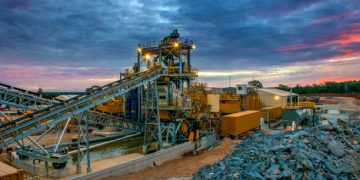Post COVID – 19: World Bank, PwC, others task Nigeria on galvanizing mining sector to cushion economic shocks
The World Bank, Price Waterhouse Cooper, PwC, and Nigerian Institute of Mining and Geosciences, (NIMG) has tasked Nigeria’s Federal Government on galvanizing the mining sector to cushion economic shocks in the post-COVID-19 era.
The organizations made this known while in a crucial session on Day 3 of the Virtual Mid-Term Review (MTR) of the Mineral Sector Support for Economic Diversification (MinDiver) Project under the Ministry of Mines and Steel Development, to look at the role of the mining sector in minimizing the impact of COVID – 19 and the global oil crisis.
The organisations advised the federal government to focus and harness the economic potentials of the sector as oil prices continue to dwindle in the global market, and highlighted some solid minerals that have high demand at the international market, which they noted included the battery minerals: cobalt, lithium; gemstones, barite, phosphate and others for government to focus on and develop. Barite is needed and used by the oil industry; phosphate for the fertilizer industry and limestone for manufacturing of cement for the construction industry.
The overall objective of the MTR is to review the progress of the MinDiver project with the World Bank, stakeholders of the Ministry, and other key actors, as well as look at new ways of integrating mining into the mainstream of the Nigerian economy to build the nation’s resilience to shocks. The Ministry and the mining sector experts believe that identifying strategic minerals in line with what mineral investors need in the international and domestic markets, should be the focus of government.
The Task Team Leader on the MinDiver Project at the World Bank in Washington, Mr. Mike Stanley, advised that Nigeria should not delay and wait for oil prices to rebound as it may not be feasible as expected, because there is the possibility for the market to experience an oversupply of the commodity from other oil-producing countries including Saudi Arabia. Stanley stated that oil before now indicated decline since 2014, hence, it has become imperative for the Nigerian government to deeply rethink and focus on developing the money-spinning and revenue-generating solid minerals, including iron ore, limestone for water carbonates, lithium, cobalt and generally think out of the box to attract investment. He added that there is a need to deepen development through the iron ore and steel deposits on the Central Economic Corridor.
“Nigeria should begin to think of a need to develop a One-Stop-Shop and understand what investors need and want as well as focus on value-added processing which will, in turn, create jobs without the jobs being moved out of the country in this COVID -19 period”, he stated.
Habeeb Jaiyeola of Price Waterhouse Cooper, PwC, in his presentation stated that with the stark reality of Nigeria’s economy facing recession due to the lockdown, the nation must begin to prepare post-Covid -19.
Jaiyeola said that “As a mono-economy dependent on oil, which unfortunately has gone down without assurance of going up, and attendant limited markets for exports due to falling global demand, the Nigerian government must begin to see the mining sector as essential.”
He further stated that the Federal Government should take advantage of current challenges, see how to revitalize and revamp the nation’s mining sector with smart plans, implementations, and activities that would rescue the economy from going down with the downward trend of oil. He also stressed the need for the ministry to effectively strategize in order to block revenue leakages and ensure payment of royalties, especially now that the sector has a crucial role to play to keep the economy afloat.
He said mining companies should be made to step up in royalty and tax payments directly into government coffers with evidence of accurate royalty data provided and presented, and they should also closely collaborate with relevant Ministries, Departments and Agencies (MDAs) in order to avoid any form of short-changing the government. For the sake of transparency, he urged corporate organizations in the sector to carry out reliable and correct financial reporting and also align with the mining council.
He also advised government to look at issues related to multiple levies which discourage miners from paying correct levies into government treasury and called on government to support and strengthen artisanal miners.
He emphasized the need for government and stakeholders to focus on the downstream of the sector now, to harness the potential it holds for the sector and the economy, instead of focusing only on extraction. Jaiyeola also urged government to intensify efforts on minerals that can drive the economy, value addition through local processing, for instance, in the growing jewelry industry.
Making his presentation, Professor Bolaji Hassan of the Nigerian Institute of Mining and Geosciences, (NIMG), Jos, Nigeria, said developing the steel sub-sector would create an enabling ground during the post-COVID -19 era for the mining industry to develop as desired and that without it, it would be difficult for the industry to grow.. Hassan noted that the development of Itakpe iron ore has become imperative in view of the present realities, and pointed out that it has become absolutely necessary for the Ministry to engage the National Steel Resources Development Agency (NSRDA), to come on board for the development of iron ore. He opined that based on the present economic situation and reality, the Federal Government should move quickly to resuscitate and revamp the Ajaokuta Steel Company pointing out that the Ajaokuta Steel Company cannot develop without iron ore and steel which Nigeria has in Itakpe and Agbaja in Kogi State, respectively. Prof. Hassan said despite the global oil price challenge, barite remains useful for drilling in the oil industry and should be classified as a mineral for the future.
























